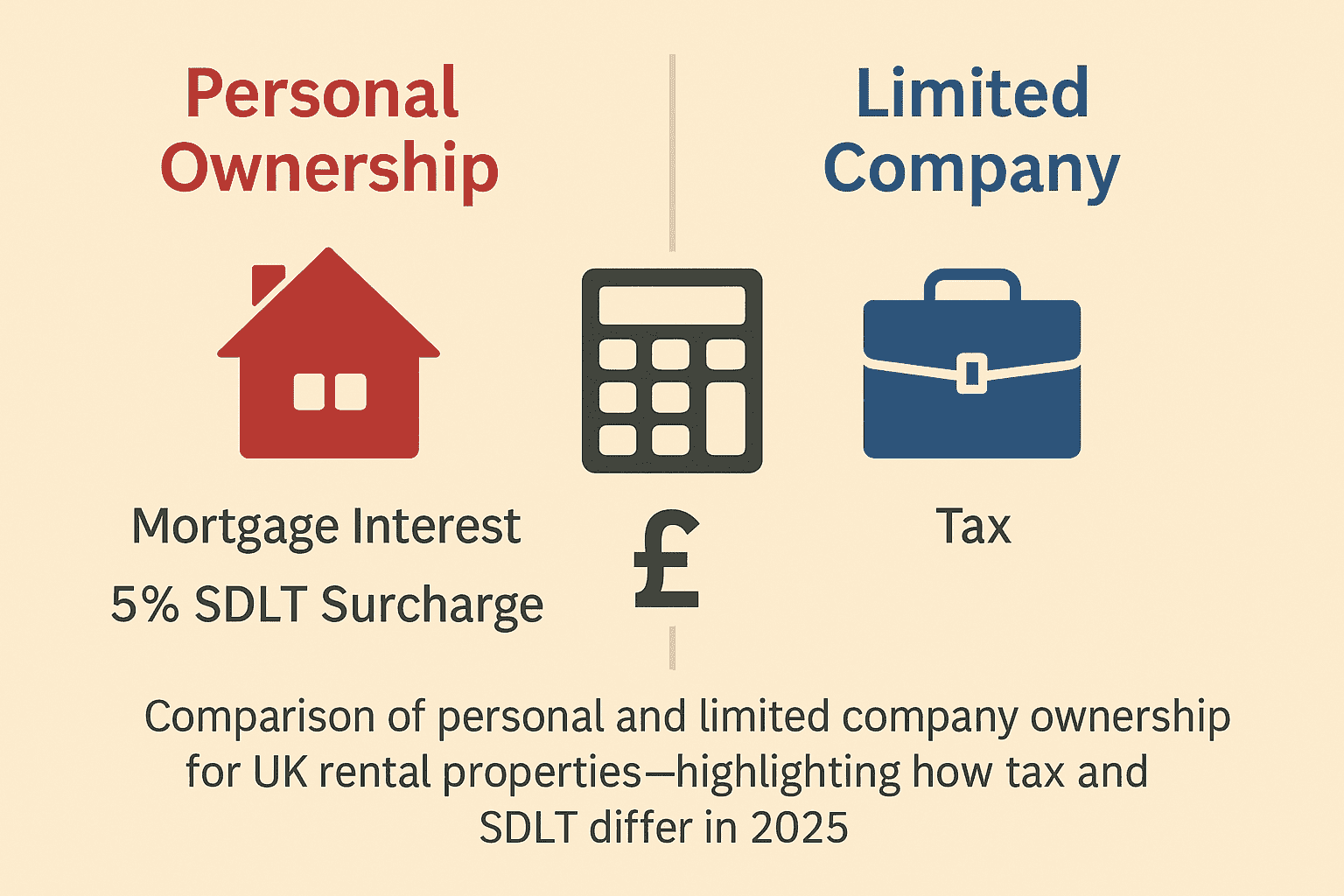Many Landlords wonder whether to keep a property in their own name or buy it through a company.
On paper, a Limited company looks like a tax-saving shortcut — but the numbers tell a different story.
📺 Watch: Limited Company vs Personal Ownership – Which Saves More Tax in 2025
Let’s look at how the rules really work, using real 2025 figures.
The Scenario
A higher-rate taxpayer owns a flat worth £230,000 with a £150,000 interest-only mortgage.
It earns £1,200 rent each month, and the Landlord is deciding whether to keep it personally or move it into a limited company before renewing the mortgage.
Both routes have clear tax consequences — especially under Section 24, which restricts mortgage-interest relief for individual Landlords.
Owning Property Personally
Income Tax
You pay tax on the net rental profit after expenses, but you can’t deduct mortgage interest in full.
| Item | Amount |
| Annual rent | £14,400 |
| Mortgage interest | £7,200 |
| Other expenses (repairs, insurance, etc.) | £2,000 |
| Actual profit after costs | £5,200 |
Under Section 24, the £7,200 interest is not deductible.
You’re taxed on £12,400 (£14,400 − £2,000).
- Tax at 40% = £4,960
- Less 20% credit on mortgage interest (£7,200 × 20%) = £1,440
- Tax due = £3,520
That’s £3,520 tax on a real profit of £5,200 — roughly 68% of the profit gone in tax.
This is why many higher-rate Landlords have been feeling the squeeze.
For a full breakdown of how this rule works, see our post on Section 24 and Mortgage Interest Relief for Landlords — it explains how the 20% credit is applied and why it often increases the tax bill for higher-rate taxpayers.
Owning Through a Limited Company
Companies can deduct all mortgage interest before calculating profit.
Corporation Tax is 19% to 25%, depending on profit level.
| Item | Amount |
| Rent | £14,400 |
| Less interest + expenses | £9,200 |
| Profit | £5,200 |
| Corporation Tax (19 %) | £988 |
| After-tax profit inside company | £4,212 |
Sounds better — until you take the money out.
If you draw dividends, you pay Dividend Tax (8.75% basic, 33.75% higher).
For higher-rate taxpayers, total combined tax can approach 45–50% once personal and company levels are added.
Transferring an Existing Property to a Company
If you’re transferring property after a breakup or change in ownership, you might also want to read our guide on What Tax applies When You’re Not Married — it explains how CGT and SDLT work when property changes hands between ex-partners.
If you already own a property personally and move it into a company:
- Treated as a sale at market value — you pay CGT.
- The company pays SDLT on the full market value (+5% surcharge).
- The lender will require a new company mortgage, usually at a higher rate.
In most cases, that’s a double tax hit before you even start saving anything.
When a Company Can Make Sense
- You plan to build a portfolio and keep profits inside the business.
- You don’t rely on the rental income personally each month.
- You want to involve family members or long-term inheritance planning.
- You’re reinvesting profits, not withdrawing them.
If you have one or two properties and need the income now, personal ownership is simpler and usually cheaper overall.
Other Differences to Note
| Feature | Personal Ownership | Limited Company |
| Mortgage interest | 20% credit only | 100% deductible |
| Tax rate | Up to 45% Income Tax | 19 – 25% Corporation Tax |
| Mortgage rates | Usually lower | Usually higher |
| SDLT on purchase | Standard + 5% surcharge if 2nd home | Always + 5% surcharge |
| CGT on sale | 18% / 24% | 19% Corporation Tax |
| Admin costs | Self-assessment | Full accounts + filings |
| Best for | Short-term / few properties | Long-term / portfolio growth |
If you’re unsure which property costs you can deduct — and which should be treated as improvements — our guide on The Difference Between Capital and Revenue Expenses explains how HMRC distinguishes between the two.
Key Takeaways
- Section 24 limits mortgage-interest relief for individual Landlords.
- Companies allow full deduction but create double taxation when profits are withdrawn.
- Moving existing properties to a company triggers CGT and SDLT — rarely worthwhile.
- A company can work for long-term portfolio growth; for one or two rentals, personal ownership is usually simpler.
Need Help Deciding Which Route Is Best for You?
Before you refinance or change ownership, get the numbers checked.
A Property Tax Review will show you:
- The tax due Personally vs through a Company
- Any CGT and SDLT costs if you transfer
- The most tax-efficient setup for your goals
Book a clarity call or email info@gracecertifiedaccountants.com to get started.
